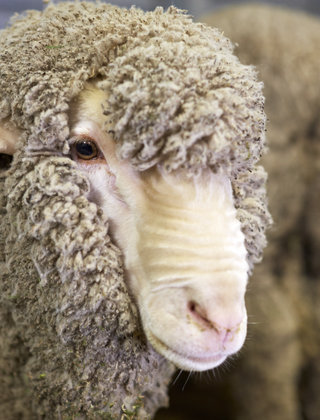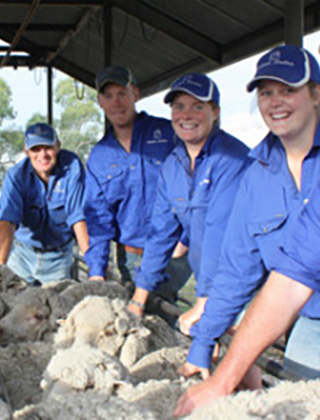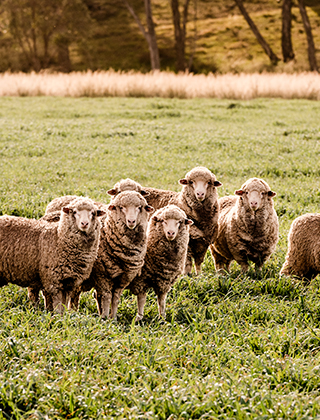Students learn about sheep management

Students from schools in every state of Australia this year gained practical hands-on sheep management experience by looking after teams of Merino wethers as part of state-based School Merino Wether Challenges.
Merino wether competitions were held this year in all six states across the country with their aim to educate high school students about the commercial production of Merino sheep. The initiatives provide the students with a memorable ‘hands on’ experience covering a broad range of sheep and wool production skills.
Each school team looked after several wethers (from studs in their state) for about six months, with the students forming a close relationship with their wethers. This provides a unique and practical experience for the students, much different from classroom learning. Each school team then showed their wethers during a competition later in the year and were judged according to their meat and wool quality.
By attending training and the judging events, and by looking after their wethers, the students gain:
- practical, hands-on skills in sheep management
- a better understanding of sheep and wool production as a business
- contact with many aspects of the Merino sheep industry
- a chance to network with industry participants and other students
- an enjoyable experience with Merino sheep and the industry
- a positive perspective on a career with sheep and wool.
The Merino wether competitions were initiated 14 years ago in South Australia by the SA Stud Merino Sheepbreeders Association (Merino SA), with similar competitions having since been introduced in New South Wales and Western Australia. Following the success of these three initiatives, students in Tasmania and Queensland last year held their first state competitions and, for the first time, students in Victoria were this year given the chance to take part in their own state competition.
All the competitions are supported by AWI, as well as individual studs, schools, teachers and students.
NEW SOUTH WALES

The winning team from St Matthews Catholic School Mudgee.
In NSW, 69 schools from across the state participated in the School Merino Wether Challenge, which was organised in partnership with the NSW Stud Merino Breeders Association, the Dubbo National Ram Sale Association and Bralca. There were more about 700 students from right across NSW and more than 400 wethers involved in the program this year. The challenge involved each school being allocated six wethers from the same age drop from Egelabra Merino Stud.
Training days were held throughout the course of the six-month challenge to provide ongoing assistance to school staff and students in caring for their team of wethers, as well as helping to develop industry skills and knowledge. With a new addition in 2024 of a tour of the Charles Sturt University Global Digital Farm, students were able to explore a range of advanced opportunities in the sheep and wool industry.
At the end of the six months, in August, students converged on the Dubbo Showground where they presented their wethers for judging on commercial value. St Matthews Catholic School Mudgee won the overall prize, followed by last year’s winner Deniliquin High School in second place and Scots All Saints College. Boggabilla Central School and Condobolin High School received encouragement awards.
At the event, students also had the opportunity to participate in activities to learn more about sheep handling and working dogs, wool harvesting, fleece typing with AWN, Fletchers International Exports, take part in a young farmers challenge with Bralca, and hear from a careers panel about the wide range of opportunities in the industry. A young judges’ workshop also enabled students to learn the skills necessary to compete in competitions at ag shows across the country.
SOUTH AUSTRALIA
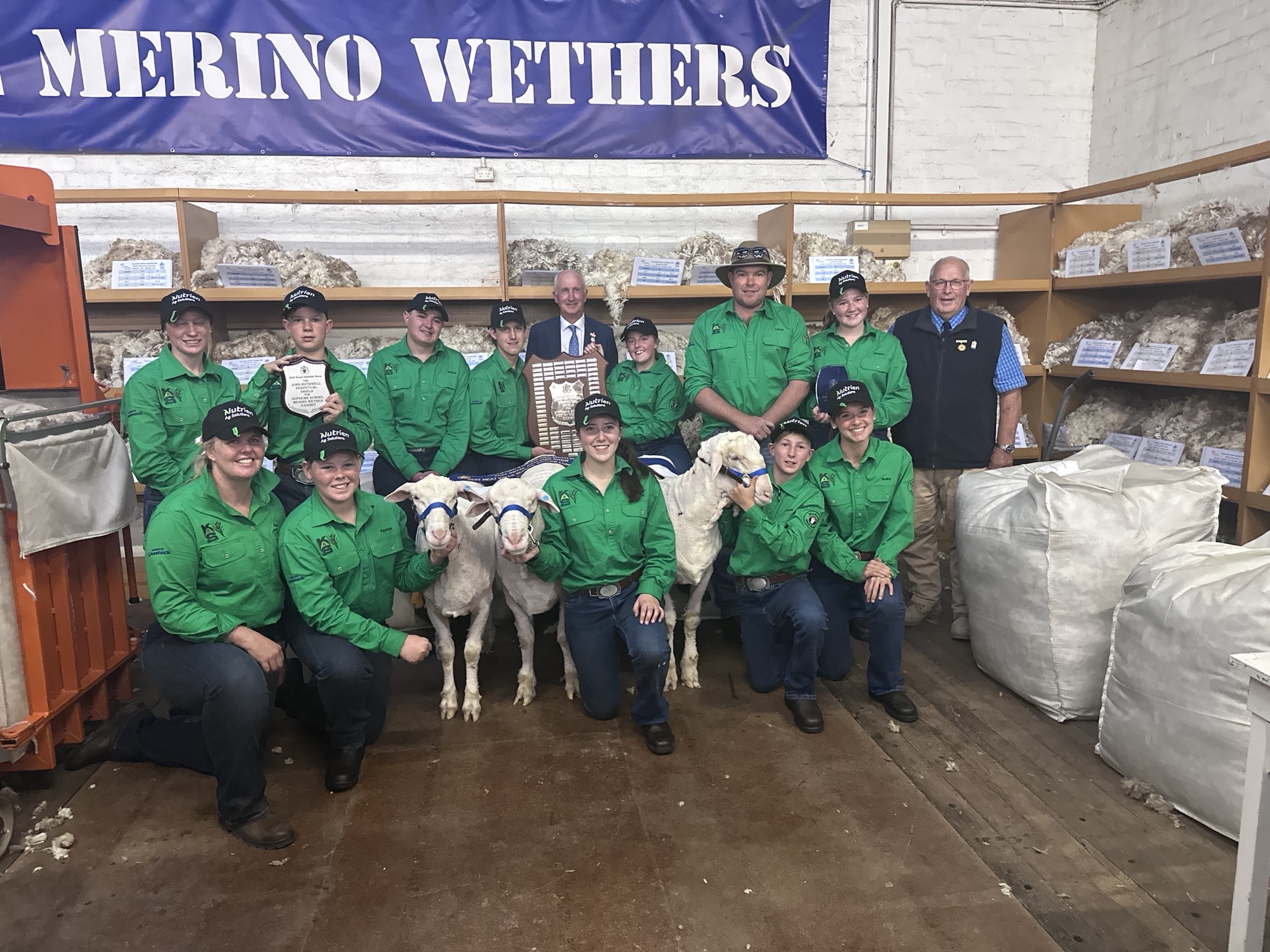
The winning team from Karcultaby Area School.
There was a large turnout of the next generation of woolgrowers – about 400 students from 42 schools – who participated in the 15th annual School Merino Wethers Competition organised by the SA Stud Merino Sheepbreeders Association (Merino SA) and held in September. 72 teams of three wethers were brought into the Stud Sheep Pavilion at the Adelaide Showgrounds during the Royal Adelaide Show. It was a hugely successful event with all the students providing a fantastic display of professionalism and dedication to the industry. As well as providing the students with a hands-on experience of commercial sheep and wool production, the competition enabled the students to have contact with many aspects of the Merino sheep industry from stud and commercial breeders, stock agents, wool buyers, through to processors. Karcultaby Area School was awarded the School Merino Wethers competition supreme ribbon.
WESTERN AUSTRALIA
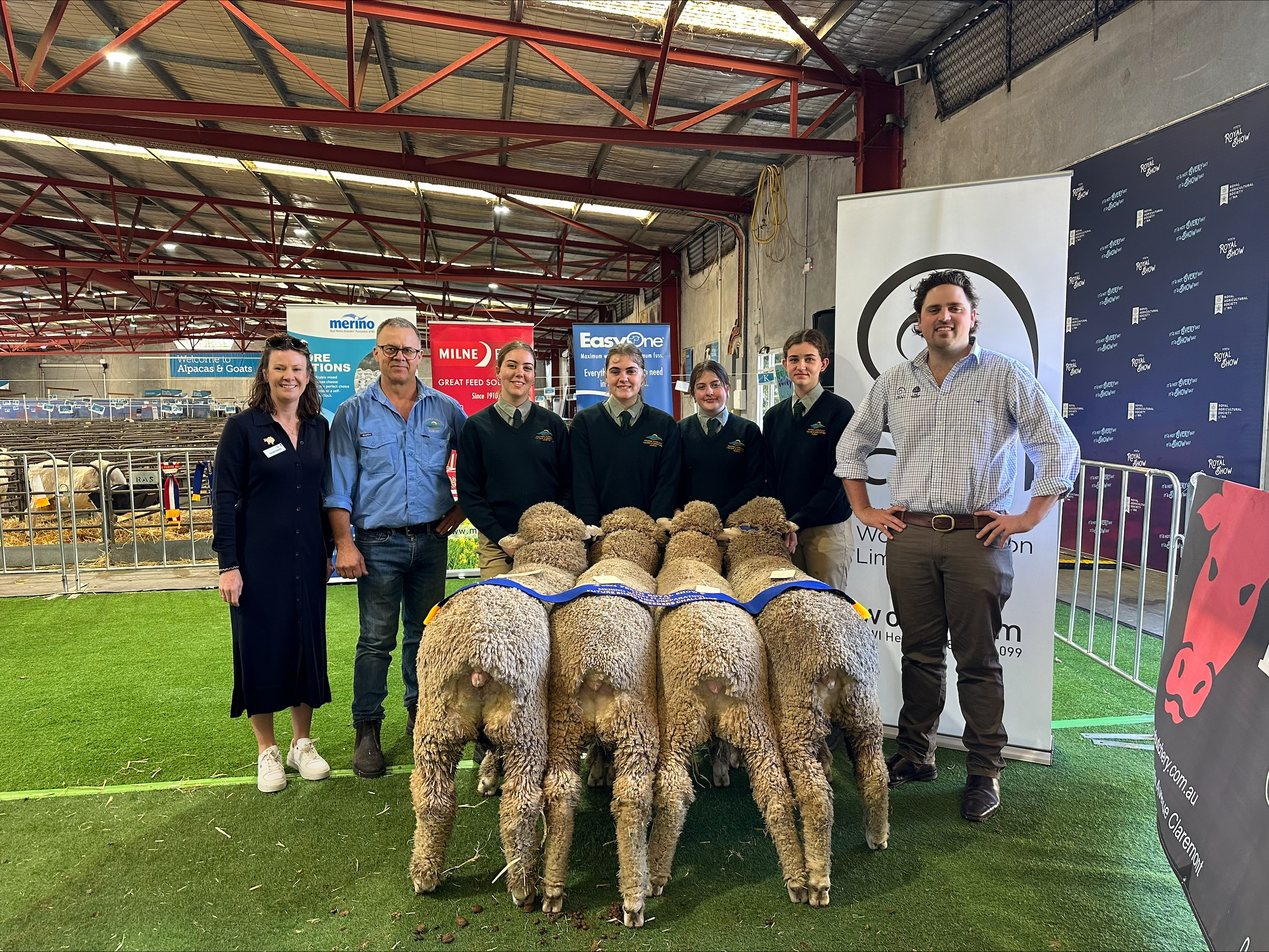
Western Australian College of Agriculture Harvey was the overall winner.
Now in its ninth year in WA, teams from five schools and colleges took part in the AWI Future Sheep Breeders Challenge that was organised in partnership with the Stud Merino Breeders' Association of WA (Merino WA). The judging took place at the end of September at the Perth Royal Show, with support from the Royal Agricultural Society of Western Australia. Teams looked after six wethers but showed four at judging. The winning team was WA Agricultural College of Agriculture Harvey, followed by Kelmscott Senior High School in second and WA Agricultural College of Agriculture Denmark in third.
TASMANIA
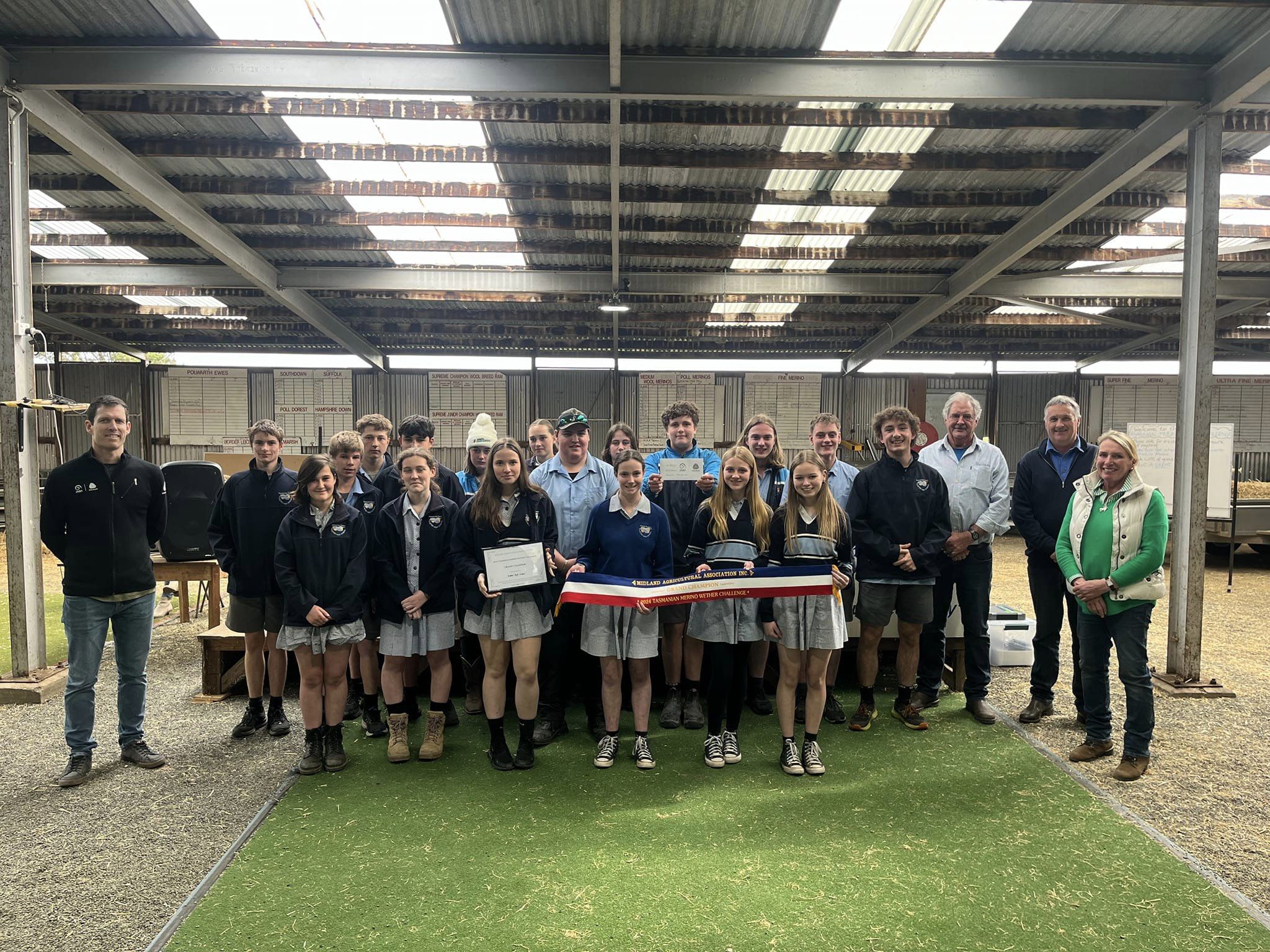
The Exeter High School teams that came first and second in the competition.
2024 marked the second year of the Tasmanian School Merino Wether Challenge, coordinated by AWI in partnership with the Stud Merino Breeders Association Tasmania. Twelve high schools received a donation of six Merino wethers from ten woolgrowers from across the state. The 72 sheep were on display at the Campbell Town Showgrounds with 130 students and 50 teachers and volunteers in attendance. The program this year also included a careers expo with seven industry representatives interacting with the students throughout the day to demonstrate the varied career options available in the sheep and wool industry. Teams from Exeter High School won the challenge and placed second with Sheffield High School placing third.
QUEENSLAND
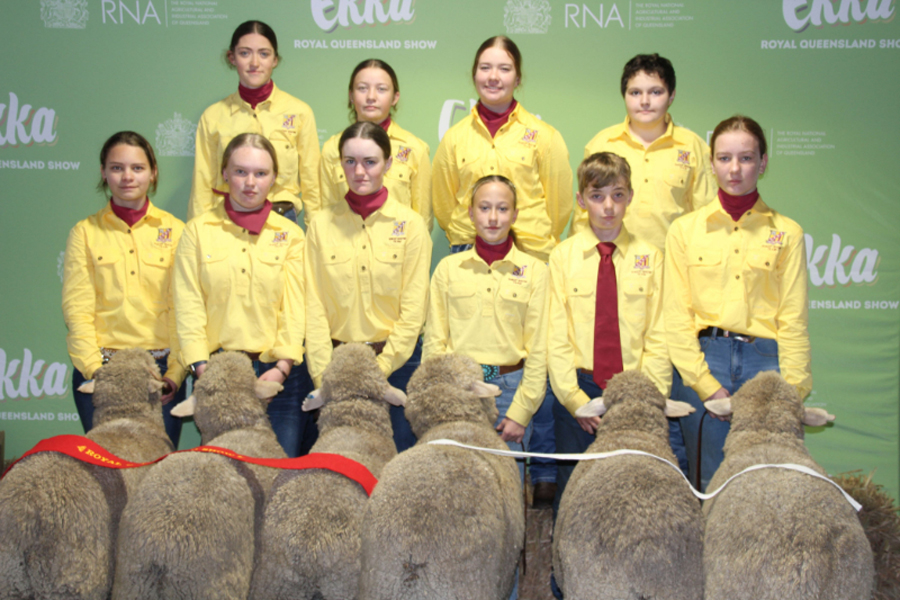
The winners from Dalby State High School.
The School Merino Wether Challenge in Queensland, this year being held for the second time, saw an increase in school participation with eight schools presenting ten teams of wethers, up from five schools presenting six teams last year. This year’s program was organised by the Queensland Department of Primary Industries. During the program, AWI provided valuable resource material for the teachers to implement in their ag programs. Each school team was provided with five wethers from Will Roberts’ Victoria Downs Merino Stud at Morven and the team picked three of the best wethers to show at the program’s concluding competition held at the Royal Queensland Show (Ekka) in August. Peter Sealey and Cecelia Cummack, both from Elders, judged the best pen of three wethers. The competition was won by Dalby State High School with St George State High School second and Oakey State High School third. All participating schools thoroughly enjoyed the program and are keen to be back next year.
VICTORIA

The winning Greater Shepparton Secondary School team.
The inaugural School Merino Wether Challenge in Victoria was established by AWI this year in partnership with the Australian Sheep Breeders Association. The Challenge kicked off in March and the response and engagement from schools across Victoria was overwhelming. There were 11 schools from across the state involving about 120 students that participated during the six months. All the sheep in the Challenge came from the Kerrilyn Merino Stud at Dunluce, west of Bendigo. A total of 66 sheep – six from each school – were on show during the competition held at Clunes Showground at the end of August. Greater Shepparton Secondary School won the Challenge, with Ballarat Grammar second and Goroke P-12 College third.
This article appeared in the December 2024 edition of AWI’s Beyond the Bale magazine. Reproduction of the article is encouraged.






